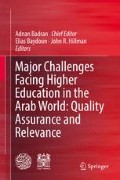Abstract
The European criteria for Quality Assurance (QA) were originally established in 2005, based on the Bologna Declaration by 29 European countries in 1999. They are based on the European Standards and Guidelines (ESG) of Quality Assurance in the European Higher Education Area (EHEA). ESG has been used, and modified, for use also by several countries outside Europe. The QA process may sometimes involve accreditation, which generally gives Yes/No answers, but Europe has moved towards periodic audits, with a strong enhancement and development approach.
Quality in higher education is a multidimensional concept, but generally it is interpreted as being fit-for-purpose. It is usually based on the ability of an institution to fulfill its stated aims, based on its mission and strategy. The starting point is the strategy, is it realistic, is it sustainable, is it relevant, and does it support good ethical practices? But the strategy of a university also needs a long-term national strategy as a background support, and also for overall national development. An important part of such a strategy should also include the research development and the services to the society components. Furthermore, the process of QA requires full commitment from the institution’s administration top-down, and it should involve the entire academic community, including staff and students. The entire process should be open and public, and thus communicated also to the institution’s stakeholders and outside partners. Yet, crucial tools for the QA process are proper databases, about the institutions themselves and about the entire national higher-education system at large, which should be augmented also by analyses of the job market and its possible trends. Up-to-date databases are necessary tools for the management of an institution and also for setting national policies.
Crucial for the success of a QA system is that it is based on trust among all the partners involved, within the university and with the outside agency as well as with the outside society at large. Trust is a tool for universities to make proper and critical self-evaluations. Trust means that the peer review is impartial and independent with the sole aim of good quality. Trust can also be strengthened by an open and communicative process, and with the final quality assessment being of public domain. It should be expected that with time the QA process leads into a culture of quality within the institution, and it is doing ‘just a good work’. In the Arab states, the next step could be a formation of a true Arab Higher Education Area.
Access this chapter
Tax calculation will be finalised at checkout
Purchases are for personal use only
References
European Commission/EACEA/Eurydice. (2018). The European Higher Education area in 2018: Bologna process implementation report. Luxembourg: Publications Office of the European Union. http://ec.europa.eu/eurydice
ENQA. (2018). ENQA message to ministers responsible for higher education in the EHEA. Paris Ministerial Conference. May 2018.
ENQA. (2015). Standards and guidelines for quality assurance in the European Higher Education Area (ESG). http://www.enqa.eu/index.php/home/esg/
Kushnir, I. (2016). The role of the Bologna process in defining Europe. European Educational Research Journal, 15(6), 664–675.
Terry, L. S. (2008). The Bologna process and its impact in Europe: It’s so much more than degree changes. Vanderbilt Journal of Transnational Law, 41, 107–228.
Bollaert, L. (2014). Quality assurance (QA) in Europe (2005–2015). From internal and institutional to external and international. Journal of the European Higher Education Area, 3, 1–24. www.ehea-journal.eu
FINEEC. (2017). Audit manual for higher education institutions 2018–2024. Finnish Education Evaluation Centre. Publications, 21, 2017.
Crozier, F., Curvale, B., Dearlove, R., Helle, E., & Hénard, F. (2006). Terminology of quality assurance: Towards shared European values? (ENQA Occasional Papers 12). http://www.enqa.eu/pubs.lasso
Vlásceanu, L., Grünberg, L., & Parlea, D. (2007). Quality assurance and accreditation: A glossary of basic terms and definitions. Bucharest: Unesco-Cepes, UNESCO.
ESCWA. (2015). Provision of education by non-state actors in Arab countries: Benefits and risks. New York: United Nations.
Sarant, L. (2016, September 1). An end to oil dependency. Nature, 537, S6–S7.
Almansour, S. (2016). The crisis of research and global recognition in Arab universities. Near and Middle Eastern Journal in Education, 1, 1–13. https://doi.org/10.5339/nmejre.2016.1.
Hazelkorn, E. (2007). The impact of league tables and ranking systems on higher education decision making. Higher Education Management and Policy, 19(2), 87–110.
El Hassan, K. (2016). Survey gives panoramic view of Arab higher education. Al-Fanar Media. 10 August 2016.
Faek, R. (2017). A regional survey: How Arab countries regulate quality in higher education. Al-Fanar Media. 2 September 2017.
Altbach, P. G. (2007). Peripheries and centres: Research universities in developing countries. Higher Education Management and Policy, 19(2), 111–134.
Author information
Authors and Affiliations
Corresponding author
Editor information
Editors and Affiliations
Rights and permissions
Copyright information
© 2019 Springer Nature Switzerland AG
About this chapter
Cite this chapter
Lindqvist, O.V. (2019). Is There More to Quality Assurance Than Quality?. In: Badran, A., Baydoun, E., Hillman, J.R. (eds) Major Challenges Facing Higher Education in the Arab World: Quality Assurance and Relevance. Springer, Cham. https://doi.org/10.1007/978-3-030-03774-1_4
Download citation
DOI: https://doi.org/10.1007/978-3-030-03774-1_4
Published:
Publisher Name: Springer, Cham
Print ISBN: 978-3-030-03773-4
Online ISBN: 978-3-030-03774-1
eBook Packages: EducationEducation (R0)

